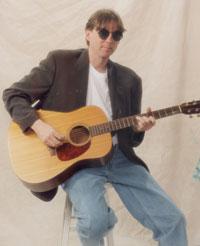David Foster
Published 12:00 am Wednesday, March 5, 2008

- David Foster
Are people who possess the ability to handle multiple endeavors blessed with interesting lives or perhaps cursed by them? Armchair philosophers can occupy themselves with that debate; however, such people are often worthy of a nod of recognition for their contributions to community — and oh, the interesting tales they can tell. Such is the case with a Horse Cave musician who is one of the driving forces behind this area’s fastest rising festival with respect to entertainment — who also happens to be a professional underground conservationist.
Sound like a strange mix” Meet David Foster, both promoter of and participant in the musical arts and head of the American Cave Conservation Association. He has led a highly varied musical life, the last decade’s worth paired with his wife Debbie Heavers. Their new endeavor is the inventive group Soulgrass which was featured in the July issue of the Amplifier. Foster’s love for both music and cave exploration led both to his position as ACCA director and to writing songs about caves which have been recognized by awards and passed on within the spelunking community. He has been one of the instrumental figures behind the Horse Cave Heritage Festival, in its third year and already a prominent event for regional and area music.
Trending
When the Amplifier spoke with Foster, he downplayed the amount of credit he should have, consistently pointing out others that should share in the credit for the Horse Cave Heritage Festival and emphasizing the years of musical collaboration with Heavers. That seems to be the way of this native Virginian who was steeped in the folk and old time music traditions; he’s an easy talker once the subject of music is brought up and the focus is not just on him.
Foster was born in Galax, Virginia, home of the second oldest fiddler’s convention, the Galax Old Time Fiddler’s Convention. His parents were both musical as well. His father, born in 1897, was 63 when David was born and was old enough to have played in the Chatauqua shows in Kansas when living there and attending Baker College; he also did barbershop singing. Both parents played piano, and David took piano lessons when he was eight; he said the family “did a lot of parlor playing.” David took up guitar in his teens and got into John Denver, James Taylor, and Don McLean.
The young Foster went to music school at Emery and Henry College, but he got deeper into folk, particularly older, relatively obscure folk like Ralph McTell and Aussie folkie Eric Bogle. The timing for the music he performed wasn’t the greatest; ?I got into folk during the disco boom,? Foster observed.
Foster earned a degree in music theory at Emery and Henry, but he didn’t do anything right after college except play coffeehouses. Foster said he started playing flea markets for tips while playing clubs — he got the idea of flea markets from someone who made money at a flea market playing under a box with a slot in the top and calling himself a “human juke box.” Foster was making $50-$60 in daily tips, until bands started moving in and “then nobody made anything,” Foster chuckled.
At about this time, Foster said he got into cave exploring, which he had first done as a high schooler in caverns near Galax. Moved by what he saw and felt in these underground worlds, he started writing songs about caving. As a songwriter, he won attention with his songs in 1981, placing his “Love Is All Around You” in a WQUT radio top 10 best of region contest and taking the first three places in the National Speleological Society’s national cave ballad contest. The Richmond Area Speleological Society gave Foster a grant for an entire album of folk songs about caves. He wrote and recorded Nylon Highway, the name coming from the nylon ropes used to traverse caverns. The songs dealt with themes of the beauty and fragility of caves and how man destroys them through direct acts (like graffiti and breaking off pieces of formations) and indirect acts such as pollution that seeps underground. There were some interesting story songs on the album. “The Green Duck Song” is a true story about a die trace that turned a woman’s pond green and all her ducks, while “The Ballad of Wilson’s John” is about an outhouse belonging to a John Wilson.
Nylon Highway was popular with spelunkers and sold around the country through cave organization publications and meetings. This recognition, however, was not the sort that financially enriches. Foster continued to perform such jobs as one where he was walking tables in a tux with his guitar playing requests, until playing Tom Lehrer’s “Poisoning Pigeons in the Park” to the wrong audience got him fired.
Trending
He got a degree in geology from Mary Washington College, then he moved to Richmond, Virginia and started working for the newly formed ACCA (“I was their first employee,” said Foster). After a time, Horse Cave lobbied the ACCA to move, and so Foster moved with them in 1987; within a year, the director left and Dave became ACCA director. Initially, his directorship was on an interim basis, but his fundraising success made him permanent director after six months.
His duties in creating a museum and educational society put music on a back burner for a time. Foster played in the southern rock band Southern Knights that played regularly at the old Mammoth Jamboree in Cave City. “Once we booked into Picasso’s,” Foster recalled, “then we discovered it was during spring break and no one was there.” Southern Knights had good original songs according to Foster, but the pressure to do covers at gigs led band members to not pursue them.
While working on a project for the Tennessee Nature Conservancy, Foster met a native New Yorker that had come to Nashville to pursue music, Debbie Heavers. Their relationship developed, and eventually Heavers came to Horse Cave with Foster, who said their marriage broke up Southern Knights. The two became partners in both music and caving; Heavers is currently associate director of ACCA. There were several attempts by Foster and Heavers to put together rock or country bands, but they kept running into walls with respect to musicians and venues. So they made a duo and performed where they could for a number of years.
Meanwhile in Horse Cave, interest was expressed two years ago to fill the void left by the absence of Horse Cave’s old Tobacco Festival. Foster circulated a flyer for a meeting to discuss starting a new festival, and the response was strong. Foster also saw opportunity for those who do original music, including him and Debbie, in the proposed festival. “Setting up the Heritage Festival was, in a way, the best thing that could have happened to our music,” said Foster. He started meeting area original music figures like Hazel Johnson, Curtis Burch and Ruth Burch, “the kind of players that weren’t just churning out the bar band cover stuff.” He also met Michael Gough and then Norman Blake. The festival committee put together money and contacts, and the Horse Cave Heritage Festival was born.
Last year when David and Debbie heard about John Cowan coming to State Street Pub, they lobbied to open for him and agreed to do it for free. They got Bob Bridges to play fiddle with them. The day of the show, the sound man balked at last minute and wanted $200 to run sound for them; David and Debbie haggled him down to $30 and paid him out of their own pocket; “We paid to get to open for John Cowan,” Foster laughed. After a well-received performance, which included a bluegrassy rendition of the Jackson 5 song “I Want You Back,” Cowan told them that he liked their “soul grass.” Foster and Heavers got Curtis Burch, Joe Larson, and Joel Whittinghill to back them up at that year’s Horse Cave Heritage Festival, and Soulgrass came into being. In Foster’s words, “We said, “hey, there’s a niche here that matches our style,” so they went into the studio last winter to record the self-titled debut. Feeling he was “with the right people,”Foster said Soulgrass, despite a limited budget, still made a record that “sounds like us.” Foster found satisfaction in that the thing he actually wanted to do is the thing that was musically most successful.
Both Soulgrass and the Horse Cave Heritage Festival must be sources of satisfaction for Foster. The Heritage Festival?s entertainment has grown from 23 acts in 2000 (with Norman Blake headlining) to 30 acts in 2001 (with John Cowan headlining). This year, 25 acts will grace the stages on September 20 and 21, but the smaller number represents “better quality acts” according to Foster. They are still getting local acts while also drawing from outside the area This year, Tommy Womack is featured, along with a range of performers encompassing gospel, blues, bluegrass, country, and rock. Area notables include Michael Gough, One Shot Johnny, the Deadnecks, Lost River, Hazel Johnson; Ruth Burch, the River Rats, Uncle Jack, Bluegrass Express, and Buck Creek. Entertainment is free on Main Street, and there will be one $20 cave show ($15 advance price) with Bonepony, the Cantrells (who played on the A River Runs Through It soundtrack), and Soulgrass.
Foster is also involved in Civil War Days on September 14 in Munfordville. He is coordinating the music for the event, which is period music and predominantly string bands.
Last summer’s National Speleological Society convention provided Foster with a pleasant surprise. He was invited to perform his cave ballads at the convention at Great Salt Peter Cave near Renfro Valley. “I forgot the lyrics to one of my songs,” said Foster, “and someone from the audience handed me the lyrics.” That’s when he learned that cave enthusiasts had been singing his songs at such meetings for the last 10 years.
Looking at the state of music today, Foster feels we’re in “the golden age of music” but the record labels and radio aren’t doing much to let folks hear much of it — “They’re still putting out what they think you want to hear,” he said. The counterbalance to this is the Internet, says Foster, which has made music and instruction available around the world and gives access to anyone who is connected to the Internet and knows where/how to look for it. That’s an appropriately egalitarian view for someone with Foster’s folk grounding. It also expresses hope for those performers outside the music business mainstream to find their audience, something Foster promotes with the Horse Cave Heritage Festival and seems to have found with Soulgrass.
Don Thomason is a writer and musician living in Dunbar. Visit him at www.myspace.com/donthomasonmusic






